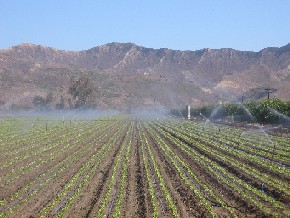
Ventura / Los Angeles County Ag Order Becomes Final
A coalition of environmental and Native American public interest groups consisting of
Wishtoyo Foundation, Wishtoyo’s Ventura Coastkeeper Program, Santa Barbara Channelkeeper, Los
Angeles Waterkeeper, CAUSE (Central Coast Alliance United for a Sustainable Economy), and
Center for Food Safety (collectively, “Coalition”) secured California’s most protective regulations to
curb agricultural pollution to streams, rivers, and wetlands in Ventura and Los Angeles counties. The
new rules (known as the “Ag Order”) were issued by the Los Angeles Regional Water Quality
Control Board and, on Wednesday June 15, 2016, became cemented in place for the next five years.
The Ventura/LA regional Ag Order contains new protections that are stronger than those contained in
any other California permit regulating discharges of toxins from agricultural lands, including:
• enforceable water quality limits for wastewater discharges from farms;
• date-certain timelines for compliance with water quality standards for farmers;
• edge-of-field monitoring of discharges from individual farms to verify compliance with water
quality standards; and
• well testing requirements to protect rural farm workers from drinking contaminated water.
California law requires farmers comply with Ag Orders issued by Regional Water Boards, which are
supposed to ensure that Clean Water Act water quality standards are being met. Prior versions of the
Ag Order for Ventura and Los Angeles counties have been in place for 10 years, yet farmers have
generally been unable to achieve water quality standards or even demonstrate that they are on track to
do so. The Coalition argued that the prior Ag Order, therefore, failed to comply with state law.
By including the stronger protections advocated by the Coalition, the new Ag Order is largely an
affirmation of the Coalition’s position that provision of a healthy environment, safe and healthy food
and drinking water, protections for farm workers, and a vibrant agricultural sector can and should be
mutually attainable goals.
Ben Pitterle, Channelkeeper’s Watershed and Marine Program Director said, “For the first time ever,
farmers can no longer just say that they plan to meet water quality standards. They actually have to do
it within a specific timeframe or face the possibility of fines.”
“This is a monumental victory for Ventura and Los Angeles county residents, who depend upon clean
drinking water and unpolluted waters that support recreational uses, cultural practices, and native and
endangered species, “said Mati Waiya, Wishtoyo Foundation Executive Director and Chumash
Ceremonial Elder. “Ventura County’s residents and species have been plagued by agritoxins for too
long.”
“Throughout California, farmworker, immigrant and low-income communities disproportionately
bear the burden of contaminated drinking water linked to agriculture production. This Ag Order will
help protect against this negative impact in Ventura County,” adds Maricela Morales, CAUSE
Executive Director.
The new rules do more to protect surface waters from agricultural pollution than those currently in
place in any other region in California and, as such, the Ventura and Los Angeles regional Ag Order
sets a positive precedent for agricultural pollution regulations being developed in other regions across
California.
“Los Angeles Waterkeeper is pleased that, for the first time ever, agricultural discharges must meet
definitive timelines for complying with enforceable water quality standards. This is a major step
forward for water quality in Los Angeles County,” said Arthur Pugsley, Los Angeles Waterkeeper
Senior Attorney.
Jason Weiner, Wishtoyo Foundation’s and its Ventura Coastkeeper Program’s General Counsel and
Water Initiative Director, adds, “No individual or corporation is above the law, or their obligation to
others and the environment. Despite the drought, revenues from Ventura County and California
agricultural operations continue to hit all-time highs. It’s time for a fair portion of those revenues to
be used to protect the commons we all depend upon.”
###
About the Coalition
Founded in 1997, Wishtoyo Foundation (“Wishtoyo”) is a 501(c)(3) nonprofit grassroots
organization with over 700 members consisting of Ventura County’s diverse residents and
Chumash Native Americans. Wishtoyo’s mission is to preserve and protect Chumash culture, the
culture of all of Ventura County’s diverse communities, and the environment that our current and
future generations depend upon. In 2000, Wishtoyo founded its Ventura Coastkeeper Program
(“VCK”). VCK’s mission is to protect, preserve, and restore the ecological integrity and water
quality of Ventura County’s inland and coastal waterbodies for all beings in the County’s diverse
community through outreach and education, restoration projects, advocacy, litigation, and
community organizing and empowerment.
Santa Barbara Channelkeeper (“SBCK”) is a grassroots nonprofit organization that works to
protect and enhance the water quality of the waters of southern Santa Barbara County for the
benefit of its 900 members, as well as natural ecosystems and human communities. SBCK is
dedicated to the preservation, protection and defense of the environment, wildlife, and the natural
resources of the waters of southern Santa Barbara County and Ventura County, within the Ventura
River watershed.
Central Coast Alliance United for a Sustainable Economy’s (“CAUSE’s”) mission is to build
grassroots power to realize social, economic and environmental justice for the people of
California’s Central Coast Region through policy research, leadership development, organizing,
and advocacy. CAUSE’s vision is that together we can create a global community where we all
contribute to, and benefit from, a sustainable economy that is just, prosperous and
environmentally healthy. CAUSE’s staff, leaders and constituency work to organize our neighbors
to address the systemic policy issues affecting the social, economic and environmental well being
of our communities. In the Santa Clara River Valley, CAUSE works with the communities of Piru,
Fillmore, Santa Paula, and Oxnard to improve these communities’ access to public transportation,
healthy food, a clean environment, and recreational opportunities, including in the Santa Clara
River.
Los Angeles Waterkeeper (“LAWK”) is a non-profit organization dedicated to the preservation,
protection, and defense of the coastal and inland surface and ground waters of Los Angeles
County from all sources of pollution and degradation, and to the maximum feasible use of water
conservation, stormwater capture, and water recycling. Waterkeeper represents approximately
3,000 members who live and/or recreate in and around the Los Angeles area.
The Center for Food Safety (“CFS”) is a national non-profit public interest and environmental
advocacy organization working to protect human health and the environment by curbing the use of
harmful food production technologies and by promoting organic and other forms of sustainable
agriculture. CFS has more than 500,000 members throughout the United States, including in Los
Angeles and Ventura counties, and with offices in San Francisco; Portland, Oregon; Honolulu;
and Washington, D.C.

Communications Consultant Lola Dvorak supports CCKA’s strategic communications by helping waterkeepers tell their stories.



